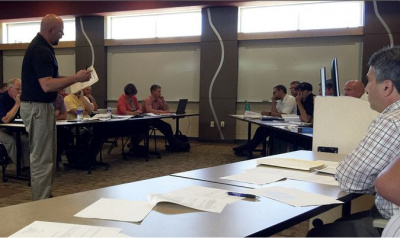Using the Codes to Benefit Your Business
Rick Parrino will tell you that one of the most important business decisions a component manufacturer (CM) can make is to foster new and beneficial relationships with building and fire officials, builders, elected officials, and all other trades. Doing so gives CMs a new lens through which to view the manufacturing and installation of the trusses, wall panels, and engineered products they sell.

“Anytime we make an effort to be part of a group that is focused on safety for our community, it makes you see things from a different perspective,” says Rick, general manager of Plum Building Systems in Waukee, Iowa and SBCA past president. “I certainly have a new found respect for the building inspectors, fire officials, and builders as to how difficult their jobs have become and their level of intelligence when it comes to knowing all the details of the codes, changes, and updates that are constantly taking place.”
To that end, Rick has gotten involved in the Central Iowa Code Consortium (CICC), a broad cross section of industry professionals who meet regularly when the new codes come out to tackle numerous ICC building and other code changes across 18 jurisdictions in central Iowa. The CICC is part of a larger visioning process for central Iowa communities, called “Capital Crossroads,” which is being guided by 63 community leaders and nearly 700 volunteers surrounding the greater Des Moines and Ames, Iowa area.
Rick says a large benefit to the CICC is having the ability to bring other trades into the discussion as the individual committees analyze new code proposals. This gives CMs the opportunity to learn new construction concepts that they can add to the products they supply, making the jobs of the trades easier when trusses are used in the building process.
“There are so many things taking place that are outside our knowledge of the framing process that in many ways affect how we do our jobs,” Rick says. “When these matters arise, we would call friends from the builder, HVAC, or plumbing trades to get their input or ask them to attend our meeting to bring their knowledge to the table for consideration.”
The CICC’s goal is to “develop a new culture of cooperation and way of doing business for local government that champion collaboration and coordination when viable to save taxpayers’ dollars and improve efficiencies,” says Jonathan Lund, CICC co-chair and Des Moines, Iowa Fire Marshal.
“The process has been a success,” Jonathan says. “It now provides the utmost level of transparency, increases communication between all of the stakeholders, and helps build connections you wouldn’t otherwise have.”
Before the CICC, Jonathan says it was difficult to make sure everyone knows about code adoptions and the potential changes and impacts. “This is a unique approach to make sure everyone is on the same page, and to minimize differences between communities,” he explains.
The CICC executive committee is comprised of 11 appointees from three groups: the Metro Area Managers Association, the Mid-Iowa Construction Code Committee, and the Metro Fire Chiefs Association. The CICC is further broken down into seven code committees, each comprised of seven members appointed by the executive committee, four local government representatives, and three industry representatives.
Rick compares his experiences on the CICC with his time on the board of SBCA. “It’s about the interaction and sharing of experiences, coupled with lessons learned from those experiences, and sharing all of it with other members to help them avoid the same pitfalls,” Rick says. “The conversations are priceless, the friendships are great, and the knowledge of knowing you have someone you can call or who might call you when they need help, is invaluable.”
Jonathan also believes the ability to bring everyone to the table is very important, pointing out that it is inevitable with code enforcement that there will be differing opinions as so many different interests are being represented. “When competing interests don’t know each other, there’s no trust built up, and typically both sides are skeptical of the other,” he says. “When you start working together, you realize you share a lot of the same goals, you build rapport between the various stakeholders in the code development process, and you get much better code requirements.”
To get the CICC established, Jonathan and others travelled to the neighboring communities to present the idea to each city council, highlighting the benefits of the consortium and what each city council could expect. They then had the cities sign a Memorandum of Understanding to gain their support.
If CMs are interested in starting a similar collaborative organization, contact SBCA staff, who can connect CMs with local building and city officials and provide support in the development process.
